Elections Commissioner Fuwad Thowfeek has told Minivan News that the second round of the presidential elections will go ahead as scheduled on Saturday.
“We will uphold the constitution and hold the election on the 28th,” said Thowfeek.
Article 111 of the constitution mandates a run-off election within 21 days of a first round of polling if no candidate gains more than 50 percent of the vote in the first round.
The decision comes despite a Supreme Court ruling on Monday (September 23) ordering all state institutions to delay preparations for the poll until it issues a verdict in a case filed against the EC by the Jumhooree Party (JP), seeking to annul the first round in which it narrowly placed third.
“We don’t believe any organisation or institution can overshadow the constitution. So we are working as per the constitution. I am trying to fulfill the national duty of the election commission. I don’t want to leave room for those who break laws and the constitution,” Thowfeek stated.
“I don’t care about punishment from the Supreme Court. If they are right, they should uphold the constitution,” said Thowfeek.
“We are asking for police support. Among the police there are those who support an election on the 28th. But due to the nature of their duty even if they want to support us they can’t without a direct order.”
The Police Integrity Commission (PIC) have called for the police to provide any assistance the EC requires to go ahead with the second round though Minivan News is aware that sources from within the police have warned that any attempts to hold the poll will be physically stopped.
Following the court ruling this week, the EC told a press conference that – after conflicting orders from the court and the Majlis – it would be guided by the constitution, which it argued ought to be the final arbiter on electoral procedures.
However while the EC members are believed to have a majority in favour of holding the election as scheduled, Vice President of the EC Ahmed Fayaz this evening expressed his unwillingness to support the move.
“I do not support this. I want to hold elections as per the law. I do not dare participate in this. I think this is backfiring. The EC cannot single-handedly hold an election, we need administrative and security support, ” he said.
“There are 3000 officials. If their opinion differs we cannot hold this without their support. In some countries once elections start, the police and state resources are at elections commission’s disposal. It is not the same here – some island and atoll councils have already said they will not support us.”
“I do support going ahead with preparations, to be ready to hold elections at any point,” stressed Fayaz.
Aishath Velezinee, whistleblower and former member of the Judicial Services Commission (JSC), the body tasked with oversight of the judiciary, has declared Monday’s injunction “a mutiny in the Supreme Court”.
“This is a mutiny in the Supreme Court. We have only seen an [injunction] order signed by four of the seven member bench. Even in a majority decision, every judge must give the reasoning for their decision in writing. We should see the other opinions,” she said.
“The Chief Justice has previously complained of orders being sent out without following due process. The legitimacy of the court order is in question.”
Velezinee cited precedent in a unanimous Supreme Court ruling given in 2009: Ruling C/2009/02, unanimous decision: only Act of God or State of War can legally delay a date specified in constitution,” she noted.
“According to the constitution there is no role for the Supreme Court in an election. There are no laws giving the Supreme Court oversight of an election. The constitution gives 21 days for the holding of second round, after the first round,” she emphasised.
Maldivian Democratic Party (MDP) candidate Mohamed Nasheed welcomed the EC’s decision, calling on all parties to respect it.
Nasheed emerged as the front runner in the first round of polls, with 45.45 percent (95,224 votes), followed by the Progressive Party of Maldives (PPM) candidate Abdulla Yameen who received 25.35 percent (53,099 votes).
JP candidate Gasim Ibrahim – who narrowly missed out on the run-off with 24.07 percent (50,422) – has commented on twitter, writing “no one is above the law. Rule of law shall prevail.”
PPM running-mate Dr Mohamed Jameel joined with fellow party members in calling for the arrest of the EC Commissioner Thowfeek.
“Our view is very clear, the election cannot go ahead. We will not allow it, no one in the country will allow it,” he said.
He added that Thowfeek’s pledge to hold voting on September 28 had created disharmony and a “rift” within society.
“[These actions] won’t ease political tensions n the country and may well lead to violence,” Dr Jameel stated.
The PPM yesterday filed an additional case with the Supreme Court, requesting a delay of one month to allow time for campaigning.
Background on the injunction
The controversial Supreme Court case, filed 10 days ago, requested that the court annul the first round void due to what the JP argued were severe discrepancies in the voter registry.
These allegations ran contrary to the reports of numerous international observers who have roundly praised the freeness and fairness of the first round, and the preparedness of the EC.
When asked about the capability of the EC during a public lecture today, former South African Constitutional Court Judge Johann Kriegler described these elections as “as good as I’ve ever seen”. Kriegler has been working alongside the EC and the UNDP in preparations for the poll.
The EC has challenged the veracity of the evidence presented in court and argued that, even were it factual, it is not sufficient to alter the outcome of the first round.
Global condemnation followed the Supreme Court’s issuing of the injunction, with the UK, EU, and the Commonwealth specifically calling for the run-off to go ahead as scheduled.
India’s Minister of External Affairs Salman Khurshid said his country was deeply “disappointed and distressed” at the development.
“Our understanding of the democratic system is that even if there are imperfections in the election system, those imperfections need to be addressed in a manner which is not destructive of the very process of elections,” said Salman Khurshid.
Indian warships were today seen performing maneuvers close to Male’, though authorities have stated the naval presence is part of a training exercise.
The Maldives Ministry of Foreign Affairs meanwhile responded to the global opprobrium by calling on international groups to “help, not hinder the state institutions in exercising their constitutional duties”.
The MDP reacted to the court’s decision by launching a series of protests highlighting the questionable ethics of the Supreme Court bench, particularly a series of leaked sex videos featuring Supreme Court Judge Ali Hameed and unidentified foreign women. The JSC – headed by Supreme Court judge Adam Mohamed and on which Gasim himself sat – rejected the recommendation from its own sub-committee that the judge be suspended.
Subsequent protested have been characterised by the presence of countless pairs of white underpants, as worn by the character alleged to be Hameed in the sex tape. Numerous arrests have been made on the island of Rasdhoo after locals hung a giant pair of underpants outside the Magistrate’s Court.
Former President Nasheed also called for tourism workers to strike should the poll not go ahead, receiving backing from the 5000 strong Tourism Employees Association of the Maldives (TEAM) today.
Following Nasheed’s appeal, the Maldives Association for Tourism Industries (MATI) issued a statement warning of “irreparable consequences” to the Maldivian economy unless the election is expedited.
Minivan News has ceased live updates on this page.
9:30pm: Elections Commissioner Thowfeek told Minivan News that he was called by the head of police specialist crime command, Hassan Habeeb, who told him that unless the Supreme Court issues an order or lifts the injunction, “police will physically stop an election from taking place”.
Fuwad said he had asked for the statement in writing, and expressed concern that police appeared to be ignoring the constitution.
9:45pm: Secretary General of the Elections Commission Asim Abdul Sattar told Minivan News: “It is ambiguous, questionable and ridiculous the way [the police] are siding with the court. The constitution is of the utmost importance – it is what all other laws and acts are based on. If one article is disregarded, the entire constitution is void.”
9:50pm: Thousands of MDP supporters have begun rallying in Male near the Tsunami Monument.
9:52pm: MDP running-mate Musthafa Luthfi at the rally: “I salute the Elections Commission for upholding the constitution”.
10:00pm: MDP MP Mariya Didi praises police and military at Raalhugandu rally – “We are all Maldivians. We all have to live together”
10:15pm: Thasmeen; we have worked with the MDP before. We believe this is a moment in which we have to work together again. We are at present facing enormous challenges in upholding constitution and protecting our sovereignty. All of us, who wish well for the country, we have to work together.
10:20pm: Speaking before going into an EC meeting, Thowfeek told Minivan News that the group strives for unanimity, and that Commissioners Fayaz and Waheed were reluctant to proceed due to the potential of arrest when contravening a Supreme Court order.
“The police, the AG, and the president are with them [the Supreme Court] so they can do anything. I believe after all these years we have recently become a democratic society, and if we become so timid, we will go back to a dictatorship.
If the Supreme Court, or any institutions go against the constitution, we have to have the guts to stand up and prevent them from violating the constitution.”
10:30pm: Ahmed Shafeeu, Acting Minister of Home Affairs, has told Minivan News that a twitter account under his name that advocated the election “must be held as stated in the constitution” was a fake profile.
Shafeeu said that a press statement would be released on the Home Ministry site “shortly”.
11:10pm: The Home Ministry has put out a press release expressing concern, with fears of unrest and anxiety among the public caused by media reports and statements from politicians.
The press release stressed the importance of respecting and adhering to the Supreme Court order to ensure rule of law.
The Home Ministry offered assurances that it would do “everything necessary to ensure the safety and security of the beloved Maldivian people”.
11:30pm: Commissioner of Police Abdulla Riyaz told the PIC in a letter today that police have informed the Elections Commission and the National Coordinating Committee (advisory body) that it could not “participate in any activity to hold the second round of the presidential election on September 28” following the Supreme Court stay order as holding the election against the injunction would be “illegal”.
However, Riyaz stated that police “have not stopped providing legally mandated cooperation to the Elections Commission”. Police are providing security to EC members as well as the commission’s office and maintaining security for ballot boxes and ballot papers sent by the EC to the atolls on September 23.
11:45pm: Translation of Nasheed’s speech at Raalhugandu rally:
“We are a party that makes pledges. We are a party that fulfills pledges. We are seeing the various state institutions of the Maldives, various individuals, standing up in the moment they had to stand up. I congratulate the Elections Commissioner. I congratulate Fuwad. The example you have shown us is one we are all proud of.
Maldivian citizens are not ready to let Maldives adrift. Maldives citizens are ready to take our nation to safe shores. God willing, voting will start at 7:00 in the morning on Saturday. Come out, come out, go vote. God willing, we will win this election.
Maldivians want jobs, shelter, healthcare, social safety, prosperous life, a dignified life, Maldivians want a day they can do honest work, live dignified lives with their wives and children. God willing, we are bringing you this day, another way, the other Maldives, a dignified life.
God willing, there will be no one to obstruct the Elections Commissioner’s decision. Some among us still have doubts in their hearts. That at any time tonight the police may arrest the Elections Commissioner. That they may take away the ballot boxes on Saturday. None of that will transpire.
Saturday will be a very happy day. There must not be any doubt in any of your hearts. It will not be an ominous day. There will not be any violence or any other kind of disruption. Early morning, you will come out of your houses, you will vote in various ballot boxes and establish a people’s government.
Whether its today, tomorrow or Saturday, our rivals need to know, honestly, there is no reason for you to worry either. You will lose in a big way. There is nothing we can do about that.”
12:22am: Acting Home Minister Ahmed Shafeeu has said action will be taken against those who violate the Supreme Court order to delay the second round of the presidential election, reports Haveeru.
In a statement to the media, Shafeeu said that the government that all state institutions must respect the Supreme Court injunction. “I urge all Maldivian citizens at this opportunity to obey the Supreme Court order. And I remind everyone that violating the Supreme Court order or assisting such an action is a crime. The government will take necessary action against such persons,” he said.
12:25am: Local media is reporting that the Supreme Court has issued a further order to security forces to immediately stop any action in violation of their previous order to stop election preparations. Minivan News is awaiting official confirmation.
00:44am: Finance Minister Abdulla Jihad has confirmed that his ministry would not be providing any funding required by the EC for the run-off vote due to the Supreme Court order requesting for the election not to proceed.
“If the EC requires any expenditure against the orders of the Supreme Court then we will not be able to honour those bills,” he said.
00:49am: The new Supreme Court order quotes Article 141 of the constitution – arguing that the Supreme Court shall be the highest authority for the administration of justice in the Maldives. It also quotes Article 145, which states that the Supreme Court shall be the final authority on the interpretation of the constitution, the law, or any other matter dealt with by a court of law.
The ruling also sites Article 20 of the Judicature law which states the presidency, Majlis, judiciary, independent institutions, police and security forces, government officials, and all citizens must obey Supreme Court decisions.
“Since it is stated clearly, it is illegal to disobey or challenge a Supreme Court order within the jurisdiction of the Maldives”.
It calls for implementation of 2013/SC-VA-J/02 (order to delay polls) until a verdict is issued in case 2013/SC-C/42, and “orders the security forces of the Maldives to implement order 2013/SC-VA-J/02 and stop any individual from disobeying it”.
The new order comes under Constitution article 237: “The security services shall protect the nation’s sovereignty, maintain its territorial integrity defend the constitution and democratic institutions, maintain and enforce law and order, and render assistance in emergencies.”
The order was signed by 6 of 7 Supreme Court judges. It was not signed by Justice Muthasim Adnan.
01:00am: Minivan News understands death threats were sent to senior EC officials at around 6:00pm: “We will kill anyone who allies with Fuad Thowfeeq against the Supreme Court order and the Maldivian constitution. Allah Akbar.”
01:15am: Minivan News has confirmed with EC President Thowfeek that reports circulating on twitter and some media outlets regarding the supposed cancellation of the election are false. He stated that the commission will confer with its legal team on Friday and reconvene at 4:00pm.
Likes (0)Dislikes
(0)Dislikes (0)
(0) 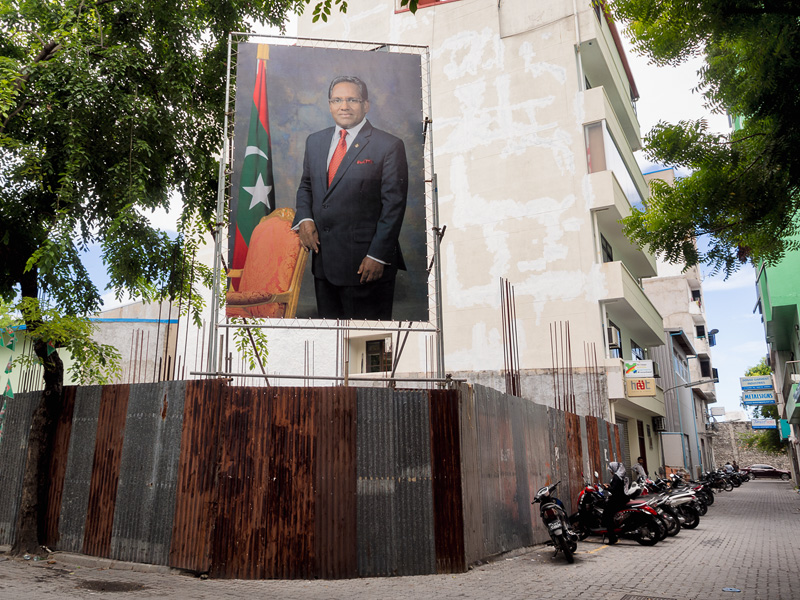
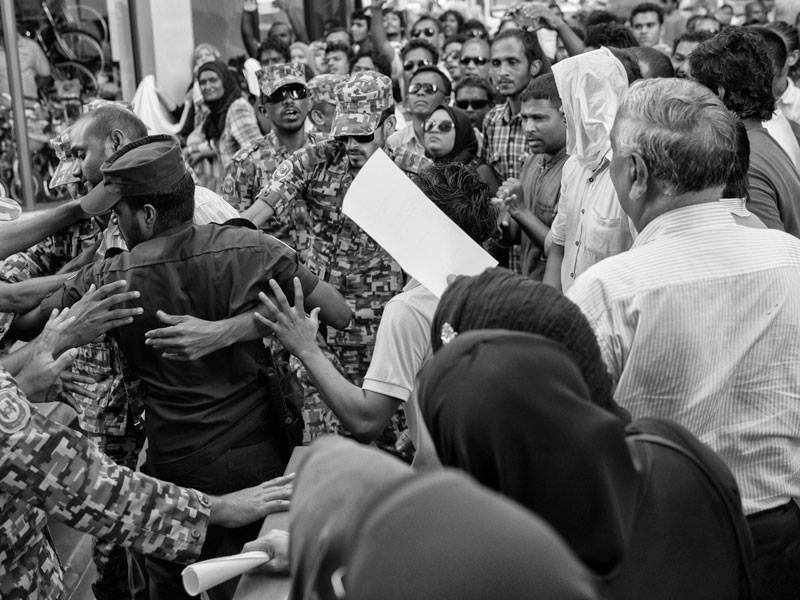
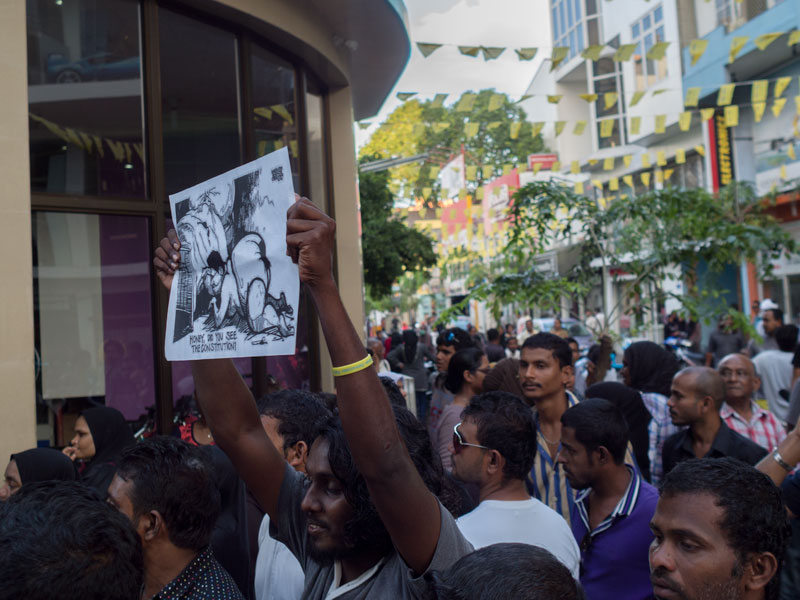
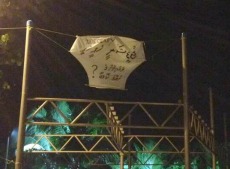 MDP members have begun using underpants in various rallies and protests following the Supreme Court’s ordering the Elections Commission to halt preparations for the presidential election run-offs, which were initially scheduled for this coming Saturday (September 28).
MDP members have begun using underpants in various rallies and protests following the Supreme Court’s ordering the Elections Commission to halt preparations for the presidential election run-offs, which were initially scheduled for this coming Saturday (September 28).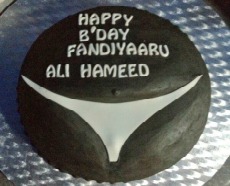
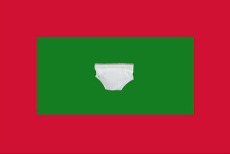 Cartoons, images, and caricatures of Judge Ali Hameed and the white underpants are spreading around social media. One such image shows a Maldivian flag with a white pair of underpants replacing the white crescent in the centre.
Cartoons, images, and caricatures of Judge Ali Hameed and the white underpants are spreading around social media. One such image shows a Maldivian flag with a white pair of underpants replacing the white crescent in the centre.